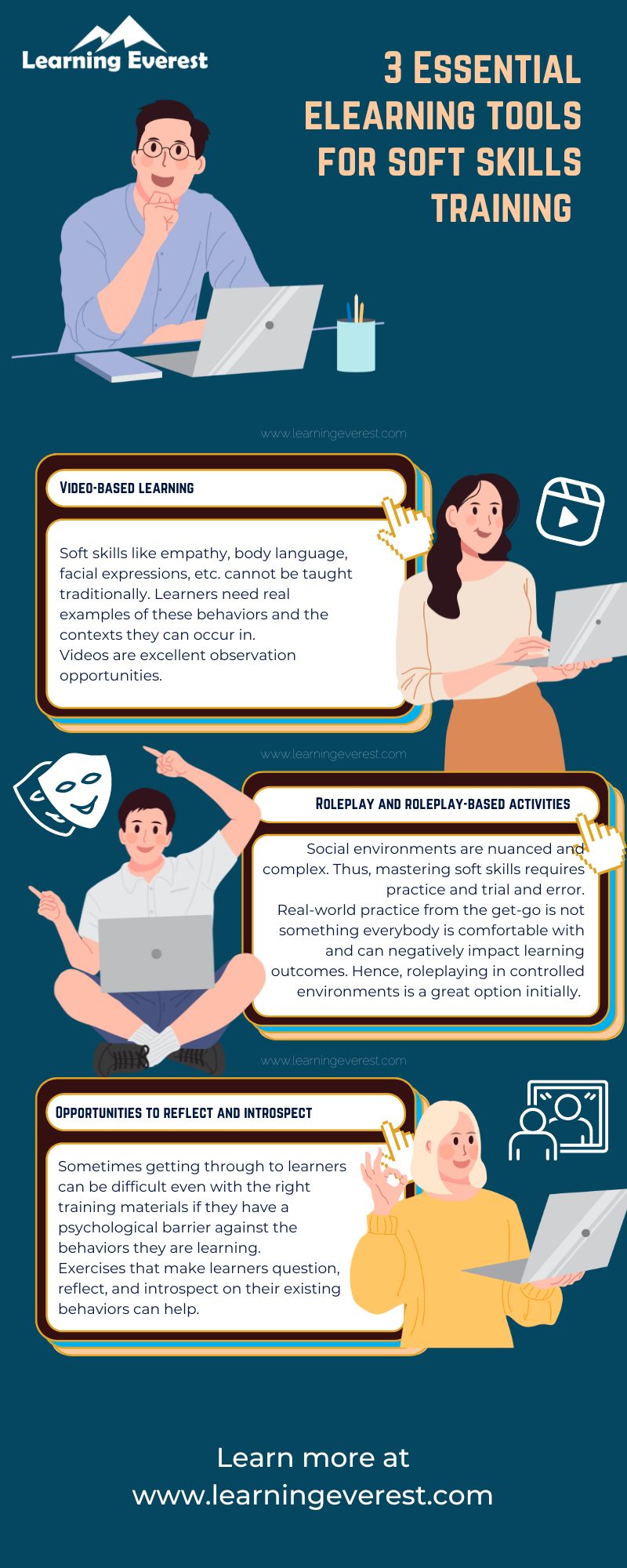The importance of soft skills training is well established in the corporate L&D sphere but to get the best out of their upskilling efforts, businesses need to ensure they are offering effective soft skills training to their employees. Seasoned learning professionals will agree that building training programs for soft skills is often more challenging than hard skills. Nevertheless, soft skills training has ended up becoming a staple in most top businesses today. E-learning, with its plethora of delivery options, provides a range of tools to provide effective soft skills training to learners. This article will introduce you to some of the best ones.
Do Soft Skills Affect Business Performance?
Soft skills do affect business performance by improving employees’ performance at work, which in turn creates an organization-wide environment of excellence.
Clear evidence of this can be found in an MIT Sloan study where a year of soft skills training given to factory employees yielded a 250% ROI in eight months.
Thus, effective soft skills training is sure to impact your business positively in the short and long run. Since soft skills are essential to everyday life, human interaction, and self-management, it should not come as a surprise that they also benefit people in their professional lives.
E-Learning Tools for Effective Soft Skills Training
Soft skills are learned differently than hard skills by most learners. Observation, practice, and reflection are the best ways to build such skills. Here are some tools you can use in your e-learning programs to ensure your soft skills training programs actually enhance learners’ soft skills.
No. 1: Video-based learning
As mentioned previously, soft skills are learned best through observation. Video-based learning materials are the single best tool to facilitate this.
One of the reasons behind this is that humans develop a majority of their soft skills over the course of their life by observing others, especially those that relate to communication and interpersonal interactions.
Soft skills like empathy, body language, facial expressions, etc. cannot be taught traditionally. Learners need real examples of these behaviors and the contexts they can occur in.
Thus, videos end up becoming excellent observation opportunities and demonstrations of soft skills, making them a core component of most effective soft skills training programs. They combine audio and visual information and are rich in detail.
No. 2: Roleplays or Roleplay-Based Activities
Practice makes perfect was never truer than this. While all skills involve an element of performance to some extent, soft skills are often performed in social settings. For some learners, this can be uncomfortable or simply something they require more familiarity with. Social environments are nuanced and complex. Thus, mastering soft skills requires practice and trial and error.
Real-world practice from the get-go is not something everybody is comfortable with and can negatively impact learning outcomes. Hence, roleplaying in controlled environments is a great option initially.
With e-learning, you can offer instructor-led virtual roleplays and roleplaying demos to learners using audio or video. Additionally, learners can also practice soft skills through roleplay-based activities where they interact with characters through exercises such as fill-in-the-blanks, MCQs, matching the correct options, etc. By doing so, learners will not only develop a deeper understanding of soft skills but also gain confidence with these skills. This combination of mastery and confidence makes roleplays and roleplay-based activities another valuable tool for effective soft skills training.
No. 3: Opportunities to Reflect and Introspect
While many believe soft skills are innate (which, they are, to some extent), often a psychological barrier is the culprit keeping one from learning a particular skill.
In some cases, these barriers are instantly recognizable, in others, they take a little more work.
For instance, a woman might have a harder time assuming an assertive tone of voice at work and see it as something she cannot change. However, digging deeper might reveal this is something she has trouble with because it is expected of women to speak in a warm, friendly tone. In this example, a psychological barrier holds back the individual instead of an innate inability to modulate their voice a certain way.
Therefore, an effective soft skills training program should prompt learners to consider why they might lack a particular soft skill. Sometimes getting through to learners can be difficult even with the right training materials if they have a psychological barrier against the behaviors they are learning.
Exercises that make learners question, reflect, and introspect on their existing behaviors and the ones they are learning create openings to challenge how they see themselves or others. Through this process of reflection, they become more open to and comfortable with adopting new behaviors.
Some ways to facilitate reflection in e-learning are:
- Story-based courses
- TED talks
- Journal activities and exercises
- Verbal prompts between modules and topics
- Group discussions through video conferences, message boards, group chats, or forums
Infographics

Effective Soft Skills Training – 3 Essential E-learning Tools Infographics





